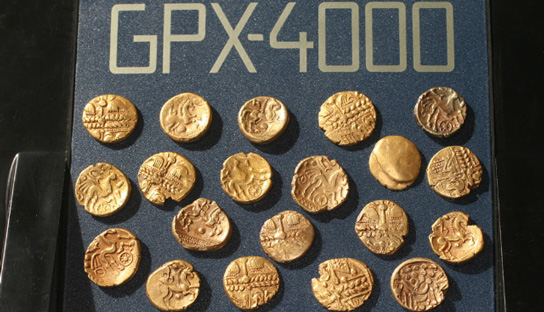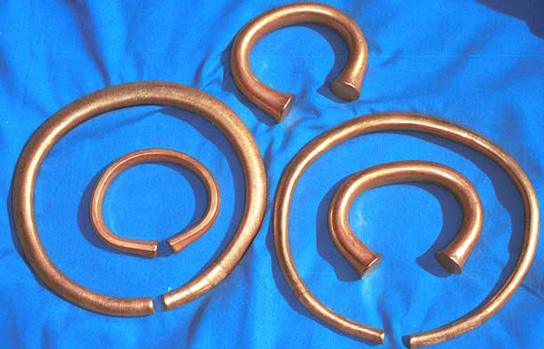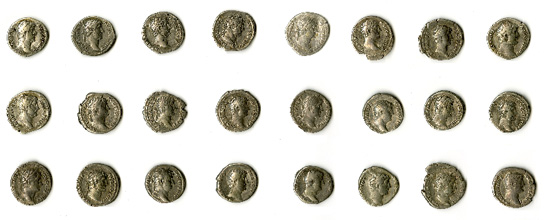One of the things I’m often asked is; where is the best place to find a hoard? To answer this question you first need to understand why possessions were buried in the first place.
Looking at the hoards discovered in the United Kingdom, they seem to fall into two groups.
The first group consist of hoards buried in times of political calm. These tend to be random, concealed by individuals hiding their wealth. Pre-historic hoards (Bronze-age Iron-age) tend to fall into this group. There is also good evidence that religious practice contributed to the ritual burial of some hoards, like the massive iron-age torc burial of Snettisham Norfolk;
http://en.wikipedia.org/wiki/Snettisham_Hoard
Roman hoards buried in the second to fourth centuries also belong to this group. As do a lot of later medieval hoards, where their owners were squirreling wealth away for the future.
The second group are possessions buried in times of great political upheaval. All through history there have been turbulent times. 54BC and the invasion of Britain by Julius Caesar, contributed to many coin hoards buried at this time e.g Whaddon Chase hoard.

The biggest of these turbulent events happened in Britain around 410AD, with the withdrawal of Roman rule. This catastrophic event must have thrown everyone remaining into panic, making it necessary to hide their wealth before fleeing south away from the advancing Germanic tribes.
One of the richest UK hoards of this time is the Hoxne hoard, which was buried circa 407AD, at the height of this strife.
http://en.wikipedia.org/wiki/Hoxne_Hoard
Other violent periods which, have been linked to major hoards, are the Saxon dark ages where the various kingdoms would war against each other. The recent Staffordshire hoard contained garnet encrusted gold pieces stripped from the swords of vanquished armies.
Other key historic events for group two hoards are;
- Viking invasions in the late eighth to 11th centuries
- Saxon/Norman conflicts 1066, including the civil war (1139-54)
- Scottish wars of independence (13th and 14th century)
- War of the roses in the 15th century, and finally the 16th century English civil war (1642 -51)
Also times of disease (plagues) have also prevented owners from recovering their fortunes.
The next question is where to search.
Group one hoards were buried by individuals, who later failed to recover them. The randomness of these events makes it very hard to predict where to find this type of hoard. So you’ll need to search near to where they lived, searching areas of habitation. Woods and dips in hilltops are also good areas, giving depositors good cover whilst hiding their treasures.
The best group one type hoard I’ve been involved in finding, was the Bronze Age find called the Milton Keynes hoard. This was found searching a Roman site which was in the process of being developed for housing. There was always a possibility of finding a random hoard on this site, but finding a Bronze Age hoard dating two thousand years before the Roman’s, perfectly demonstrates the randomness of this type of hoard.

The second group is a lot easier to predict. If a hoard has been linked to a turbulent historic event, there’s an excellent chance this event befell others close by. So the best place to find a hoard in these situations is to search areas where other hoards have been found. A perfect example of this is Berwick upon tweed, where the Scottish wars of independence constantly changed the boundary between Scotland and England. Each time this happened, it must have been a very bloody event, looking at the number of hoards found there.
So to recap
- Search areas where previous hoards have been discovered, there may be another pot still laying undiscovered.
- Research areas that have had violent histories, sites where a lot of inhabitants died (by the sword or through plagues).
- Try to imagine good places to hide a hoard… woods and hills have produced good results for other searchers.
And the last thing to remember; If a hoard has been scattered, there’s always a good chance of finding a few coins missed by the original discoverers… and as in the case of our first hoard, we found 627 coins following up a previous hoard of 297, so it’s always worth a follow up search!

So get out there and find something!
Gordon Heritage




















Comments